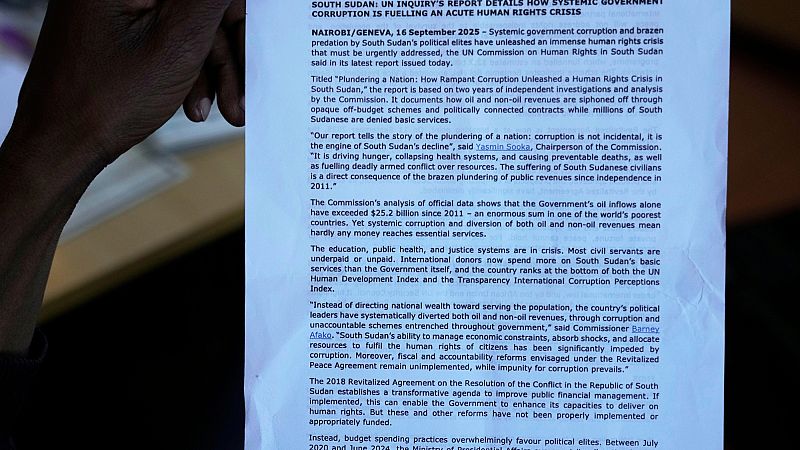South Sudan: UN report denounces 'systematic' government corruption amid food crisis

The United Nations on Tuesday blamed systemic government corruption in South Sudan for the human rights crisis plaguing the country.
In a new report, the UN Commission on Human Rights in South Sudan accused the country’s political elites of diverting public revenues from oil and other sources for their own benefits, at the cost of the country's 11 million people.
The chairperson of the commission, Yasmin Sooka, said “corruption is not incidental” but “is the engine of South Sudan’s decline.”
"It is driving hunger, collapsing health systems, and causing preventable deaths, as well as fuelling deadly armed conflict over resources. The suffering of South Sudanese civilians is a direct consequence of the brazen plundering of public revenues since independence in 2011," she added.
The commission conducted two years of independent investigations and analysis. It found that the government’s oil inflows alone have exceeded $25.2 billion since 2011, but looting of revenues means hardly any money reaches essential services.
The UN report also alleged that the government's oil-for-roads program funneled oil revenue to companies associated with Benjamin Bol Mel, a businessman close to President Salva Kiir and who was appointed to one of five vice presidency positions earlier this year.
The Commission also said South Sudan has failed to improve public financial management. As part of the 2018 Revitalised Agreement on the Resolution of the Conflict in the Republic of South Sudan, the government had pledged to "ensure prudent, transparent and accountable management of national wealth and resources to build the nation and promote the welfare of the people."
In a written statement, the government called many of the allegations “absurd,” and said the report contained “methodological errors” and overstepped the commission’s mandate. It also said it had not been given sufficient time to respond to the findings.
South Sudan sits at the bottom of both the UN Human Development Index and the Transparency International Corruption Perceptions Index.
The world's youngest nation also continues to suffer from an intense food crisis, with 7.7 million people being acutely food insecure or worse and hunger reaching "near-record levels," according to the World Food Programme.
The new UN report set out 54 recommendations for the government to end corruption, strengthen accountability, and prioritise the population’s basic needs.
Today

